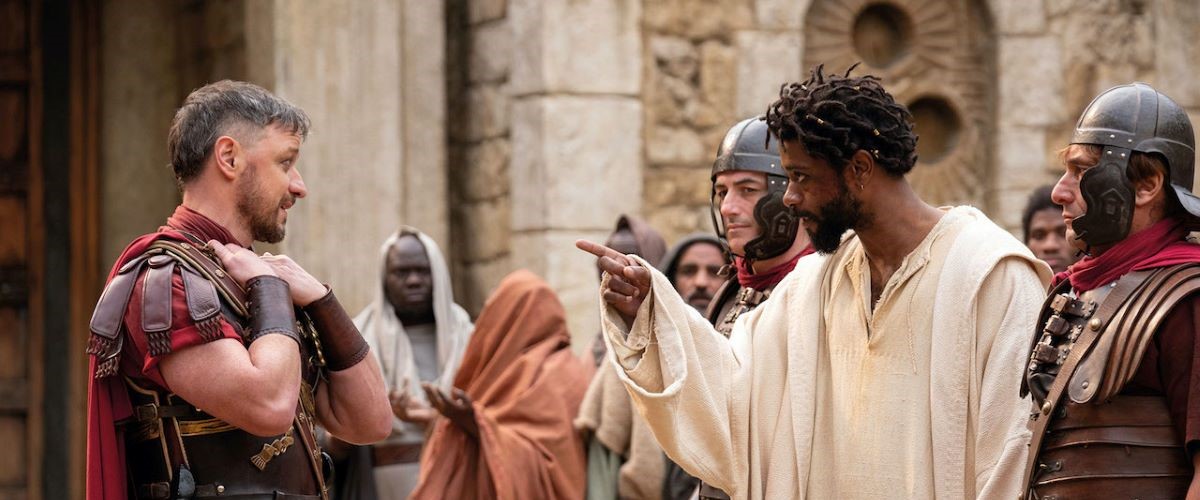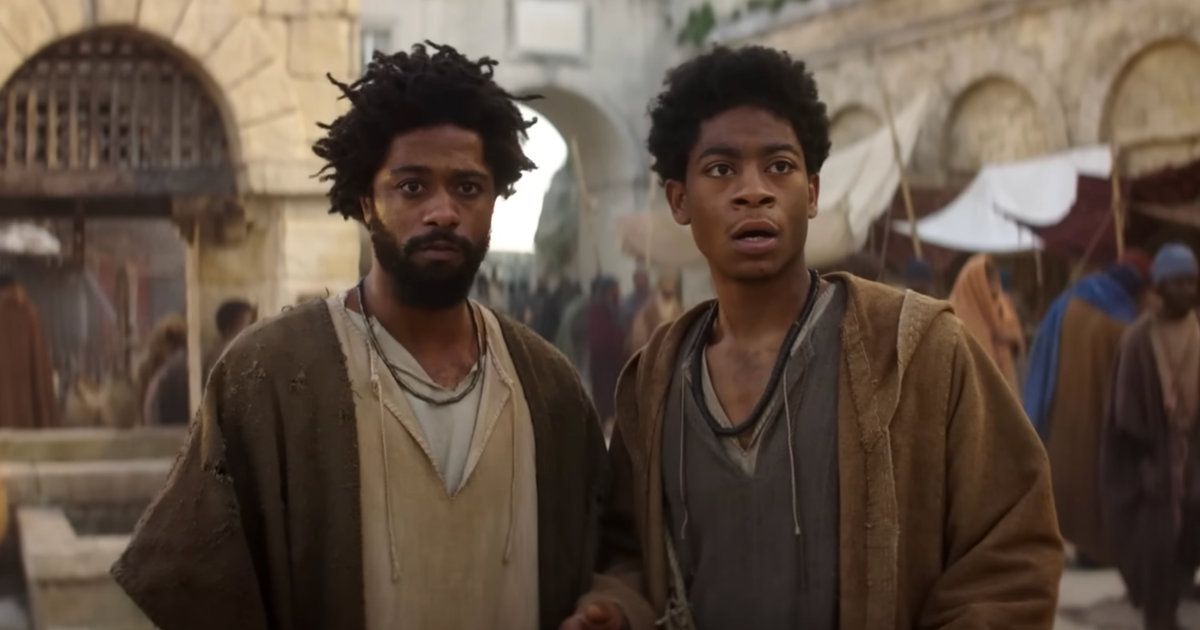|
Review by Daniel Lima Writer-director Jeymes Samuel has said that he wanted The Book of Clarence to explore the crevices of the grand Biblical narrative, to serve as a counterpoint to totemic works like Ben-Hur and The Greatest Story Ever Told and focus on the everyday people who are left out of those stories. That intent is absolutely nowhere to be seen. This could have been originally conceived as a farce, satire, or post-modern Passion Play, but it could never be taken as a genuine attempt to explore such foundational stories in a new way. What it actually is is a vapid, asinine tract, too adherent to its convictions to be effective satire and too committed to limp comedy to serve as a thoughtful examination of faith. Set in Jerusalem in the year of the Lord 33, the film follows Lakeith Stanfield as the titular ne’er-do-well, a hustler and drug dealer who lives on charm and moxie. After he finds himself in debt to a local crime boss, he has a revelation: to join the flock of a new religious sect led by a man named Jesus Christ, who claims to be the son of God. His efforts to get out from under the thumb of a local rogue snowballs into a movement, and he finds himself, his family, his friends, and his community swept up in a storm that ultimately puts them into conflict with the Romans that lord over them. The Judea of this film is a heightened reality. It doesn’t take a theologian or scholar to see that this is not reflective of life as it was; the citizens are played by a Black ensemble, white Roman legionnaires patrol the streets like American police, modern slang is used, and modern trappings like hair salons, nightclubs, and drug dealing are adapted into this historical setting. This is all mostly tongue-in-cheek, but it’s so simple-minded that it can’t help but feel juvenile. When these parallels are meant to be treated with any degree of seriousness, they completely fall apart. One of the great strengths of Samuel’s last film, The Harder They Fall, was its incredible ensemble. Unfortunately, the performances here do not match. Stanfield has never felt less compelling a screen presence, a big problem in a film where it is essential to believe people might actually want to listen to what he has to say. The supporting cast is adequate, but no one leaves any impression, with the notable exception of a cameo spoiled in the opening credits. To be fair, they do not have much to work with. Clarence is a particularly unlikable protagonist, and most of the other characters are one-note cliches, with only a handful revealing themselves actually to be two-note cliches. The cast of The Harder They Fall had some crackling material to work with. It’s hard to imagine any human being capable of selling this dreck. At first, The Book of Clarence positions itself as a comedy. This makes sense: the premise is already ludicrous, and it seems like a deliberate play on the seminal satire The Life of Brian. Sadly, comedies have the frustrating need to be funny to work, and that is not the case here. This has some genuinely dire, lazy, tired, cringe-inducing attempts at jokes. Stanfield claims to “have the cobblestones on lock,” like the modern parlance “streets on lock.” Jesus Christ himself tells an annoying woman named Jezebel that one day, everyone will know her name, a reference to the slang usage of the name. It’s all the lowest-hanging fruit, delivered with a painfully belabored setup before the groan-inducing punchline. It’s genuinely surprising that there are no rapping grandmothers or a “well that just happened.” It would be reasonable to expect that a comedy set in Biblical Jerusalem might have some satirical edge, something to say about the church or Christian dogma, or any number of critiques to offer one of the primary foundations of modern Western culture. Instead, The Book of Clarence goes for a rather tortured analogy between the oppression of the city’s denizens by the Romans and the oppression of Black people in the modern United States. Black men stopped by legionnaires because they “fit a description,” the Romans throwing spears into the backs of men running away, whether played for laughs or drama, all of this is a hack — surface-level observations that lack any deeper interrogation of the systems in place that allow for these evils. If this movie were made two decades ago, it might have been novel, if rudimentary; today, they are just rudimentary. That said, there is something insidious underneath this milquetoast social commentary. While no fiction is necessarily beholden to historical fact, how a storyteller twists and distorts history to suit their needs says much about their worldview. The fact is the religious persecution of Jews by the Roman Empire is not analogous to the systemic racism faced by Black people in America today. Why does Samuel subsume their suffering into the Black experience, to the point that the characters are not even explicitly referenced as Jews? Perhaps it speaks to a certain instinct among some intellectuals to view the Black experience solely through the lens of suffering, to such an extent that the particulars of the oppression of others cannot be unwound from the oppression of Black people. Perhaps it simply speaks to a desire to make an “Important Film,” knowing that the religious content would not survive any amount of serious scrutiny. Whatever the case may be, the attempt at commentary here feels entirely mercenary, a cynical and superficial play at profundity that is frankly insulting. So, what does The Book of Clarence have to say about Christianity? Precious little. Though the film positions itself as a doubter’s journey to moral clarity and faith, it has absolutely zero interest in offering any meaningful adversity to his growth. When Stanfield declares that he will become a new Messiah, championing that knowledge is greater than faith, that inspires a multitude of questions. What does such a message mean to the daily lives of his brethren? How is that more attractive a prospect than the message that Jesus preaches? If he is trying to become a proto-empiricist, why does he resort to chicanery to mimic miracles, which are meant to be proof of the divine? If he offers nothing to his would-be followers, no promise of an all-loving God, or an afterlife of eternal bliss, why would anyone follow him? What exactly does “knowledge is greater than faith” actually mean to him and everyone else? Predictably, these questions are all studiously avoided. It just all works out. Clarence realizes the error of his ways without anyone actually calling him out on them and makes the grand climactic gesture proving he is a changed man just over halfway through the film. Only then does the movie reveal itself to be a sham. All the lame attempts at satire and commentary were a mere smokescreen for what is, at the end of the day, just another traditional, conservative, preaching-to-the-choir faith-based movie about the inherent goodness of Christ and his message. The rhetoric about focusing on the people left out of these grandiose stories, the barest flicker of any challenging question of the institution of religion, or the nature of blind faith dissipates. Ultimately, the aims of the film are indistinguishable from any right-wing kitsch marketed to an entirely Christian audience.
Nothing is inherently wrong with a film that simply aims to placate an audience that wants to see their values parroted back to them on screen. There’s nothing inherently interesting about that either. More than that, the narrative structure of a traditional faith-based story is antithetical to making something genuinely insightful. When the only goal is to reinforce the worldview of a niche audience, any potential for a more profound and incisive perspective is obviated, even if it would make for a stronger story that ultimately still is reflective of that worldview. What makes Christianity so compelling, dramatically and otherwise, is not the acceptance of Jesus Christ as the son of God as an immutable, objective fact that can be observed with one’s own two eyes, a truth that everyone should submit to. The beautiful thing about the faith is that it is blind, that regular everyday people who will never actually witness a miracle must find some way to cling to their belief despite all the temptation and pain of the material world, whispering for them to give it up. That might not be the story of Thomas the Apostle or John the Baptist, but it is the story of untold millions who have devoted themselves to the teachings of Jesus. Considering Samuel’s alleged impetus, it’s a shame the same could not be said of Clarence. In fairness, there are vestigial hints here and there of something more audacious, if not in the message, then in form. The world might be paper thin, but the Italian location shooting and intricate sets do sell the illusion of a city from thousands of years ago. There are some beautiful costumes and a handful of inspired visuals, and the soundtrack is pretty good (though the score is as hackneyed as the script). At the end of the day, however, none of these meager craft elements can make up for the intellectual dead end that The Book of Clarence sets out to create. To sit through the agonizing comedy, the self-important and insufferable attempt at a political message, only to face the realization that this film has no desire to actually engage with its own conceit, is a punishment as heinous as anything devised by the Romans. The Book of Clarence is in theaters beginning January 12. Rating: 1/5
0 Comments
Leave a Reply. |
Archives
July 2024
Authors
All
|
|
|
disappointment media
Dedicated to unique and diverse perspectives on cinema! |


